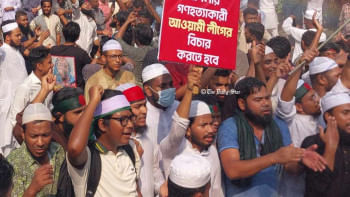Bangladeshis look down the barrel
The rights of some six lakh Bangladeshi migrants in Malaysia are being seriously curtailed due to policies adopted by the Southeast Asian country as part of its efforts to combat a slowing economy.
It has abruptly hiked medical costs and levy on foreign labourers that will badly affect the Bangladeshis who sent home almost $1.4 billion in 2014-15 fiscal year.
Malaysia's economy began slowing down about a year back and sees no sign of recovery anytime soon, according to economists.
The economy is expected to expand at a slower pace in 2016 due to the easing of private consumption growth, continuation of low oil prices, and the effect of low commodity prices on exports, the World Bank said in a report in December last.
It further said private spending is "not likely to pick up substantially" in the near future in Malaysia.
Now it takes more than 4 Malaysian Ringgits to buy one US dollar, which was around RM 3 early last year.
Sohel Rana, 35, works at a construction company in Penang. He said he used to send home RM 500 a month and his family would get around Tk 13,000 early last year, but now it is worth only Tk 9,000.
"My monthly wage is 1,100 Ringgit. If I send home Ringgits equivalent to Tk 13,000, I cannot manage my expenses here with the rest of my income. So, I am working three to four extra hours alongside my 10-hour daily work," he told this correspondent over the phone.
"Now if the levy is increased, I will be in real problem because my company will deduct the amount from my salary," Rana said.
MEDICAL COST HIKE
In the budget for 2016, Malaysia withdrew medical subsidy for foreigners and the decision took effect in January last, in violation of a UN convention.
According to the UN Convention on the Protection of the Rights of All Migrant Workers and Members of Their Families-1990, migrant workers shall enjoy treatment not less favourable than that which applies to nationals of the state of employment in respect of health, wages, holidays etc.
Earlier, Malaysian public hospitals used to charge foreigners 50 percent of the actual cost of treatment. But now migrants have to pay 100 percent of it.
Malaysia is expected to earn an extra RM 40-50 million a year from the increased medical cost of the 2.1 million documented foreigners, Malaysian media reported.
"If a Malaysian pays 1 Ringgit, a Bangladeshi will have to pay 100, explained Mohammad Harun Al Rashid, regional coordinator of Kuala Lumpur-based NGO Caram Asia.
"I saw a Bangladeshi migrant who had come to a hospital with high fever, but gone back without treatment after learning about the high medical cost," he told The Daily Star over the phone from Kuala Lumpur.
This correspondent visited the Malaysian capital in mid-January this year. There he met a Bangladeshi worker named Faruk Hossain who had a leg fractured in a workplace accident.
Faruk said he was coming back home for treatment as he could not afford it there, thanks to the hiked medical cost.
"I have taken first aid treatment at a local hospital here. That's all I could afford … The treatment cost is very high, and my employer did not agree to bear it," he told The Daily Star.
Caram Asia's Rashid said as per law, all foreign workers should have insurance coverage but in reality, most of them don't have that. "Also, the insurances do not cover outpatient services."
LEVY HIKE
From March 18, the annual levy on each foreign worker has been increased to RM 1,850 from RM 1,250 in manufacturing and construction sectors, to RM 640 from RM 590 in plantation and to RM 640 from RM 410 in agriculture.
However, the minimum wage of RM 900 remains the same.
Though the employers are supposed to pay the levy, it in reality is passed on to the workers and deducted from their monthly wages.
"Since the compulsory implementation of minimum wages in 2013, employers were allowed to deduct the annual levy payments from the foreign workers' monthly salaries," said Secretary General A Sivarajan of the Parti Socialis Malaysia (PSM), a socialist party of the country.
He fears such a situation may turn the foreign workers into indentured slaves, reports Malaysian news portal Malaysikini.
Glorene Das, executive director of Tenaganita -- a human rights body in Kuala Lumpur -- said when the migrant workers pay higher levy, medical costs and utility bills, they have to send home a reduced amount of money.
"On the other hand, Malaysians need to pay taxes only when they earn more than RM 3,000 a month. Thus, migrant workers are in fact the highest taxpayers in terms of income and levy," she told this correspondent via email.
Despite this, says Glorene, these workers neither enjoy any benefit from these taxes nor are covered by safety nets such as the Employees' Provident Fund or the social security schemes whereas they do the "dirty, dangerous and demeaning jobs" shunned by the Malaysians.
Ignoring these facts, Dhaka signed a labour export deal with Malaysia on February 18.
However, Malaysia on March 12 scrapped the deal after trade unions and civil societies there expressed concerns over deteriorating condition of the migrants who are already there.
Contacted, Sayedul Islam, counsellor of Bangladesh High Commission in Kuala Lumpur, claimed Malaysia had not communicated the policies to the high commission.
"I cannot comment," he said.
CR Abrar, professor of international relations at Dhaka University, thinks it is important to explore new labour markets, but at the same time the government authorities need to work more sincerely to ensure migrants' rights.

 For all latest news, follow The Daily Star's Google News channel.
For all latest news, follow The Daily Star's Google News channel. 



Comments